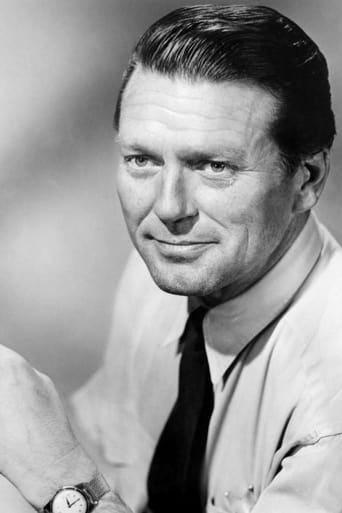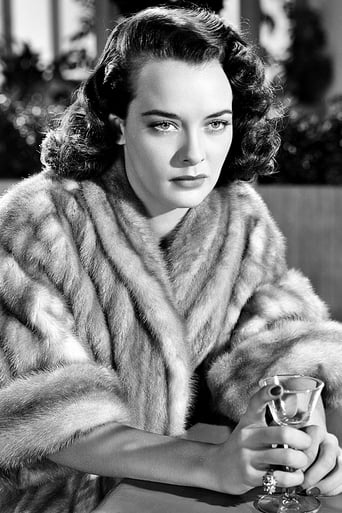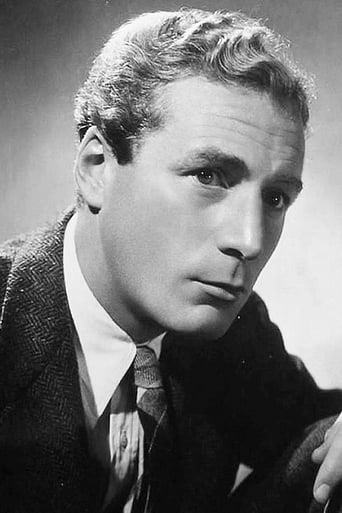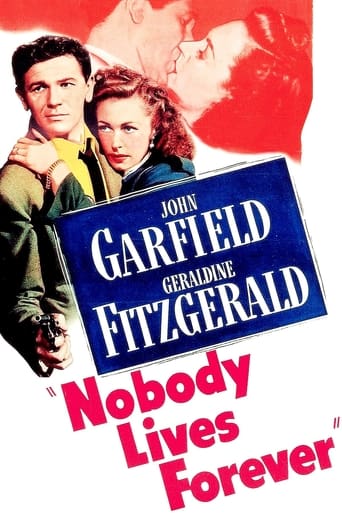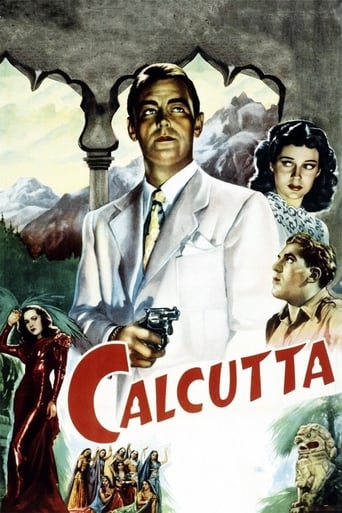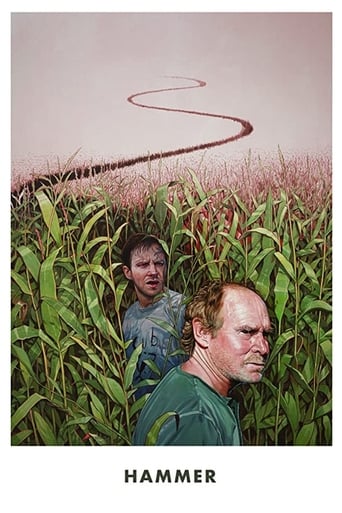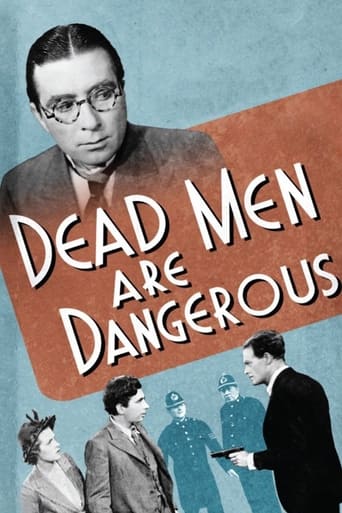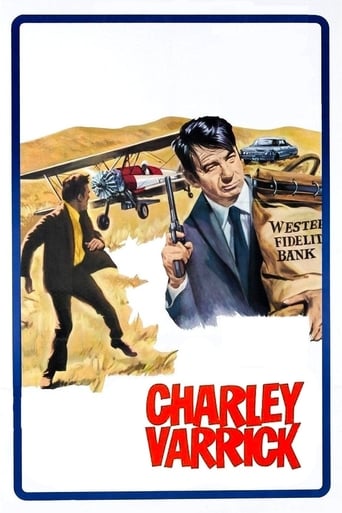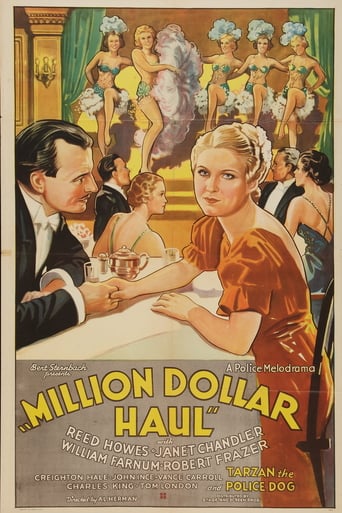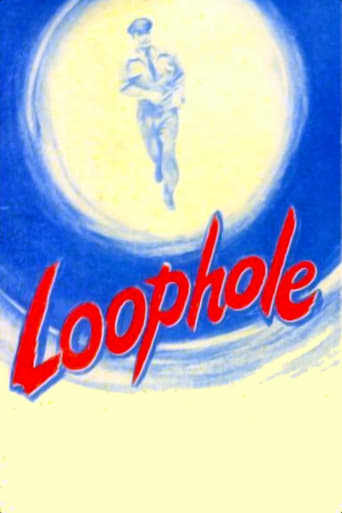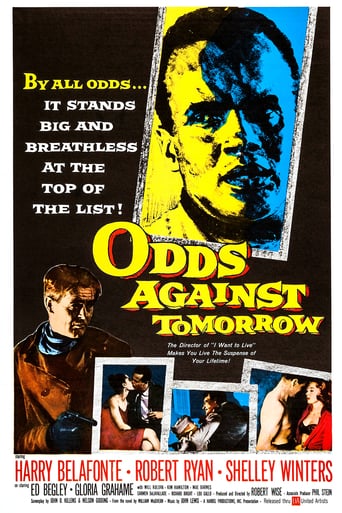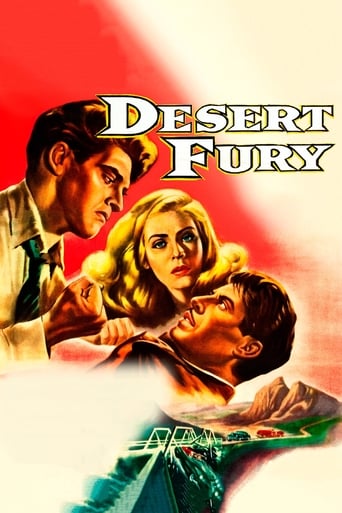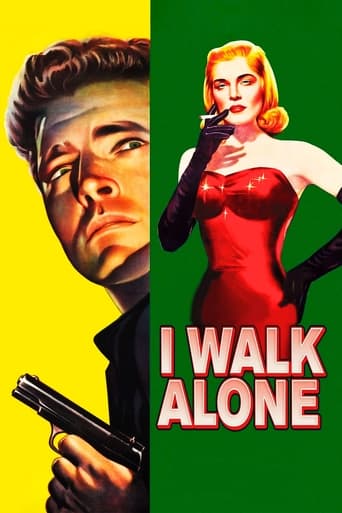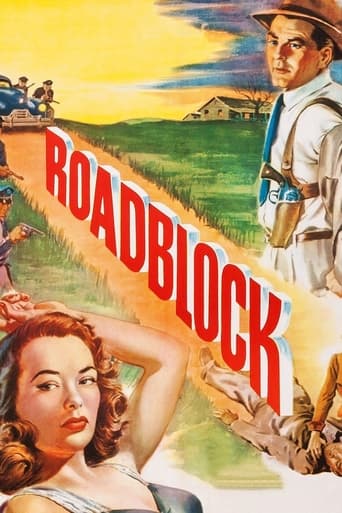
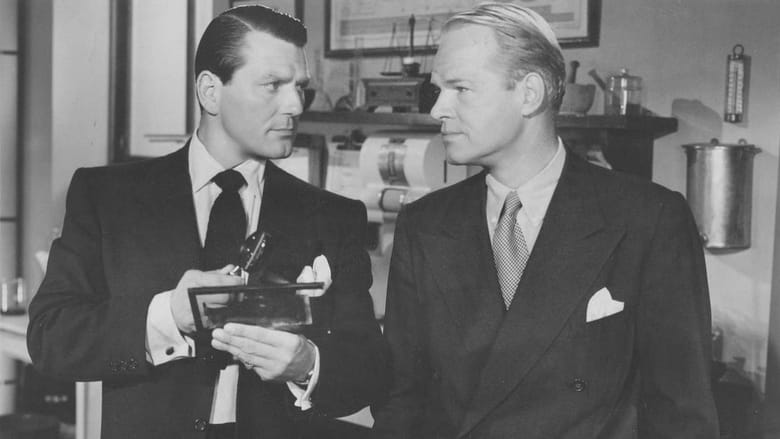
Roadblock (1951)
An insurance agent's greedy girlfriend with a taste for mink leads him to a life of crime.
Watch Trailer
Cast


Similar titles
Reviews
Charles McGraw (Joe Peters), Joan Dixon (Diane), Lowell Gilmore (Webb), Louis Jean Heydt (Harry Miller), Milburn Stone (Egan), Joseph Crehan Thompson), Janet Scott (Mrs MacDonald), Dave Willock (airport clerk), Dewey Robinson (Mike), Joe Forte (Brissard), Barry Brooks, Frank Marlowe (policemen), Ben Cameron, Joey Ray (hoods), Martha Mears (nightclub singer), Harry Lauter (Saunders), Jean Dean (airline hostess), Phyllis Planchard (Bobbie Webb), Steve Roberts (De Vita), Dave McMahon (police radioman), Howard Negley (police captain), Peter Brocco (crook in cemetery), Richard Irving (Partos), Clarence Straight (Talbot), John Butler (hotel clerk), Taylor Reid (Green), Harold Landon (nightclub bartender).Director: HAROLD DANIELS. Screenplay: Steve Fisher, George Bricker. Story: Richard Landau, Daniel Mainwaring. Photography: Nicholas Musuraca. Film editor: Robert Golden. Art directors: Albert S. D'Agostino, Walter E. Keller. Set decorators: Darrell Silvera and Jack Mills. Costumes designed by Michael Woulfe. Music: Paul Sawtell. Music directed by Mischa Bakaleinikoff. Song, "So Swell of You" (Mears), by Leona Davidson. Assistant director: James Casey. Sound recording: Frank Sarver, Clem Portman. RCA Sound System. Producer: Lewis J. Rachmil.Copyright 24 July 1951 by RKO Radio Pictures, Inc. No recorded New York opening. U.S. release: 17 September 1951. Australian release: 4 January 1952. 73 minutes. SYNOPSIS: Hardboiled insurance investigator falls for gangster's moll. PRINCIPAL MIRACLE: The surprisingly competent job of direction handed in by little-known Harold Daniels. Particularly exciting and well staged is the climactic chase along the Los Angeles riverbed. Between 1943 and 1965, Mr, Daniels directed no less than fourteen other movies, all of little significance. In fact, the only one that fans would recognize is the 1961 TV feature based on Lee Falk's "The Phantom."COMMENT: This late entry in RKO's film noir cycle deserves to be better known. Charles McGraw of "The Narrow Margin" becomes even more interestingly abrasive on the wrong side of the law, whilst Joan Dixon makes a most convincing femme fatale. As the principal heavy, Lowell Gilmore provides a fascinating light touch which contrasts well with the usual demonic portrayals. Louis Jean Heydt proves just right for the thankless role of Mr Honest, and there are the usual top character turns from such as Peter Brocco, Janet Scott and Dewey Robinson. The story (from the pen of none other than Daniel "Out of the Past" Mainwaring) not only presents a trio of involving principals but moves at a fast clip right up to its shattering climax. Production values are solid and the movie is beautifully photographed in typically noir style.
After an ingeniously twisted opening sequence, "Roadblock" tells the story of an honest man's descent into criminality before ending with a well-staged car chase that concludes at Los Angeles' concrete riverbed. The man's downfall is caused by his obsession with a woman that he wants so badly that he can't think straight but her only interest is in the finer things in life and the money that's needed to buy them.Having successfully recovered a large sum of stolen money that had been insured by their firm, a couple of L.A. insurance investigators decide to head home separately and when one of them, Joe Peters (Charles McGraw), encounters a sexy brunette at the airport, he's immediately attracted to her. Later, he's surprised to find her sitting next to him on the plane and soon discovers that she'd posed as his wife to get her ticket at half price. When their plane has to make an emergency landing because of a storm, they have to share a hotel room for the night and it quickly becomes apparent that Diane Marley (Joan Dixon) is a gold-digger who sneers at Joe's modest salary and says that he's not in her league. When they land in L.A., Diane re-emphasises her lack of interest in Joe and they go their separate ways.Immediately after his return to work, Joe's assigned to investigate a fur-store robbery and when he's shadowing the prime suspect, local racketeer Kendall Webb (Lowell Gilmore), sees that he's accompanied by Diane who's adorned in an expensive fur stole. She's now Webb's mistress and says that she's working as a model. When Joe learns about a shipment of $1,250,000 in old bills that his company is insuring, he presents Kendall Web with a plan for robbing the train that's due to carry the cash from L.A. to San Francisco and agrees to be paid a one-third share of the loot for his part in the caper. During the Christmas holiday period, when Webb leaves Diane on her own while he goes home to visit his family and she spends time alone in a bar where the barman goes into raptures about the pleasures of family life, she has a change of heart and decides she wants to marry Joe, just as he is.Joe discovers it's too late to back out of his involvement in the robbery and after marrying Diane, is on honeymoon in a mountain cabin when the train heist goes ahead. This seems to provide him with a cast-iron alibi, but complications develop when he's assigned to work as part of the team that's brought together to investigate the crime.With its lively pace, hard-boiled dialogue and gripping story about the dangers of giving in to temptation, this highly entertaining thriller is exciting and interesting from start to finish. Despite its low-budget status, "Roadblock" also has a really good cast with Charles McGraw standing out as the tough guy who trades his integrity and so much more to win the woman he desires so powerfully.
Charles McGraw was the toughest looking star and his gravelly voice was exactly what you would expect, but in this movie he proved he was a big pushover for a dame. The film started in an exciting way with a man witnessing a murder, then being held up. He claims he isn't so innocent and will split robbery proceeds of $100,000 50/50 if he is released. I won't give anything away but the film doesn't let up from there.Money is the theme - the lack of it, wanting it and what it can give you. "Honest" Joe Peters (Charles McGraw) is an insurance investigator who is quite content with his work and his pay - until he meets a beautiful icy stranger, Diane (Joan Dixon) at the airport. In an amusing scene she gets a cheaper ticket by posing as his wife, but it also means they have to share the same hotel room when the plane is stranded, due to bad weather. Diane is a model, and is looking for a man with wealth but there is something about Joe that she likes and he feels the same way about her. The next time they meet she is the mistress of a racketeer but she renews her friendship with Joe. Joe desperately wants to give Diane all the things he thinks she deserves and so approaches Kendall Webb (Lowell Gilmore) with plans he has for a mail robbery - he has inside information due to the insurance company he works for. Meanwhile, in the weakest part of the film Diane has changed her mind and is now content for Joe to be just an "Honest Joe" on a minimum wage. He can't get out of it and he and Diane honeymoon up in a mountain cabin as he awaits his share of the money to be delivered in a fire extinguisher. Somehow mountains and canoeing do not seem to come naturally to Diane, who, all through the film has worn a different fur coat in every scene!!! Joe's partner Harry (Louis Jean Heydt) smells a rat. It is his cabin and he had just bought a new fire extinguisher the year before. The stage is set for a gripping finale in the Los Angeles River (without the water!!!) There is a symbolic last scene as Diane totters away (on high heels) to an unknown future.Joan Dixon, who was an extremely beautiful Gene Tierney look-alike, was a protégé of Howard Hughes, but, alas, one of his failures. She left films in 1952 to marry but it didn't work out and the next year she was back at the studios trying to pick up the pieces - unfortunately she couldn't.
This film contains one film's most intriguing ideas: whether an honest man whose life and career are built around law-enforcement would throw away all his principles for love? Unfortunately, this film doesn't quite become good enough to make us care about this question.Joe Peters (played by Charles McGraw) is an insurance investigator. He and his partner Harry Miller (played by redoubtable character actor Louis Jean Heydt) are the best in the business. The film opens with them springing an elaborate but ingenious trap on a bank robber in order to trick the thief into revealing where he hid his stash. It's a well-written, well-acted, surprising opening scene and raises the viewer's expectations for the film.Sadly, these expectations are not met. Peters is detailed to get the money back to Los Angeles (although why they simply would not deposit the cash in a bank and have the funds wired to L.A. seems not to have occurred to the men). On the way, Peters runs into a woman, Diane (played with a sort of bored iciness by Joan Dixon), who pretends to be Peters' wife in order to con the airline into giving her a half-price ticket to L.A.One of the most important obstacles to overcome in a film like this is the viewer's disinclination to believe that the insurance investigator is as honest, principled and dedicated as he must be in order for his later moral fall to be believable and interesting. Unfortunately, "Roadblock" never tries to overcome this hurdle. Poor Peters immediately falls for the greedy, icy, selfish Diane -- although why is never made clear (Dixon's portrayal makes Diane completely unsympathetic, which in turns leads the viewer to be suspicious of Peters' sudden love for her). It is completely out of character. Had the film set up Peters' character better -- perhaps by giving us glimpses of how emotionally empty he was feeling, or perhaps by having him confront his loneliness -- "Roadblock" would have been a better picture.From this point on, however, "Roadblock" is simply a standard crime film. It cannot really be considered film noir, as it does not try to explore any of the seediness of the criminal world or give us insight into the "reality" of crime. In fact, the main criminal -- Kendall Webb, played by Lowell Gilmore as if he were sleepwalking through the role -- is a playboy with a wife in a penthouse in Vegas.Once Peters makes the decision to try to woo Diane (who refuses to marry for love, only money) by helping Webb knock over a bank and escape the clutches of the law (which, by the way, is seemingly non-existent in the world created by "Roadblock's" writers) and the insurance company (one wonders why the FDIC is never mentioned, although it existed at the time this film was made), the only thing worth paying attention to is the actual plotting and crime itself. I have to admit that this is a tightly-written little crime drama, with a believable heist that is well executed by the thieves and which unravels (as it must) due to solid detective work rather than chance and coincidence (as in so many lesser films).But the heart of the film -- Peters' moral collapse, the effect this has on his personality (he becomes angry at work, which is a plot element stolen from "Double Indemnity") and marriage to Diane, and the lengths to which he goes to keep his ill-gotten gains (and hence Diane) -- are not nearly as well-written or acted. Charles McGraw (who had a long and fairly illustrious career as a character actor) turns in a good performance as Peters. His desperation and agony over the though of losing Diane is palpable and subtlely acted, and he has a terrific way of acting with his face (check out the scene where he stages Webb's murder and has to watch the body burn) that really helps lift the film from C-grad to B-grade. But it's not enough to overcome the stolid acting by Dixon and Gilmore.The film's terribly predictable ending -- the bad guys get their comeuppance, the woman abandons her greed and falls in love, the best friend is betrayed, etc. -- doesn't help, either. There's nothing special about Nicholas Musuraca's cinematography, except for the obsessiveness with medium shots -- and it is nowhere near as inspired as his work on "The Magnificent Ambersons," "Deadline at Dawn," or "The Bachelor and the Bobby-Soxer." Another 45 minutes of character development at the front of the film would have helped set up Peters much better and given us more interest in the character of Diane.


